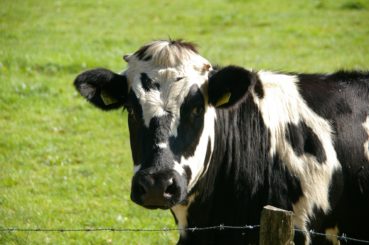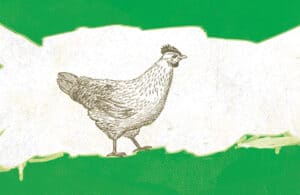
I was raised in a Christian house, accepted Jesus as my Savior when I was a child, and have continued to grow (and stumble, and repent, and rejoice) in faith throughout my life. As an evangelical, I read the Bible for many years before I began to see the importance of attending to the welfare of God’s created world. In today’s culture, too often marked by individualism, materialism, and a consume-all-we-can-as-fast-as-we-can mindset, I’ve come to believe that the discipline of creation care is a matter of vital urgency to Christians and to the health of the church.
Jesus prayed that his followers would seek God’s will “on earth, as it is in heaven.” We know from reading the Scriptures that God’s original intent for creation was one in which humans and other creatures did not eat one each other: “Then God said, ‘I give you every seed-bearing plant on the face of the whole earth and every tree that has fruit with seed in it. They will be yours for food. And to all the beasts of the earth and all the birds in the sky and all the creatures that move along the ground—everything that has the breath of life in it—I give every green plant for food.’ And it was so” (Genesis 1:29-30). After human sin disrupted the shalom of God’s creation, humans and other creatures began to fear, and to kill, one another.
But we have truly Good News to share! Jesus’s death and resurrection point us to the current and coming reality that the Creator is reconciling all of creation back to God: “The Son is the image of the invisible God, the firstborn over all creation. For in him all things were created: things in heaven and on earth, visible and invisible, whether thrones or powers or rulers or authorities; all things have been created through him and for him. He is before all things, and in him all things hold together. And he is the head of the body, the church; he is the beginning and the firstborn from among the dead, so that in everything he might have the supremacy. For God was pleased to have all his fullness dwell in him, and through him to reconcile to himself all things, whether things on earth or things in heaven, by making peace through his blood, shed on the cross” (Colossians 1:15-20).
Is it possible to live in a broken world without death or killing? The sin of humankind has made that idea almost laughable. But just because we will be unable to realize the fullness of God’s reconciled Kingdom does not mean that we don’t try, by the grace of God, to live into the promise now.
Through my study of Scripture, I’ve come to believe that many of the ways we treat animals today fall outside what can, with integrity, be called responsible stewardship. Sport hunting in particular is a tragic shortfall of our Kingdom mission, both inconsistent with our special role as God’s image-bearers in the world and directly counter to Jesus’s commands to seek first the Kingdom of God and refrain from violence.
Many of the ways we treat animals today fall outside what can, with integrity, be called responsible stewardship.
As I conducted research for my book Vegangelical: How Caring for Animals Can Shape Your Faith (Zondervan, 2016), I learned that 75% of hunters in the United States identify ‘recreation’ or ‘to be close to nature’ as their motivation for killing animals. But hunting isn’t re-creation—it’s death, often violent death. In some cases, hunting is part of deeply flawed wildlife management systems in which humans develop economic structures around the maintenance of eco-systems that have been damaged by human activity.
There is an important distinction to be made here between hunting for sport and hunting for subsistence. I have never had to rely on killing animals to feed my child, and that is a privilege I acknowledge and I do not begrudge those who simply have no other option. And sometimes when I give a presentation on animals in factory farms who are used for food, there is an individual in the room who will raise his hand and say something to the effect of, ‘I only eat meat from animals that I hunt’. While I don’t believe this is an ideal choice, particularly for a Christian, it is a far cry from the sick system of prolonged horrors endured by billions of animals on factory farms each year.
“Every animal of the forest is mine, and the cattle on a thousand hills. I know every bird in the mountains, and the insects of the fields are mine,” says the Creator and sustainer of the whole world in Psalm 50. And in Psalm 147, we learn that God provides for animals, not for what they do or how they function, but simply to delight in the pleasure of provision. The world belongs to God, who is working in and through and in spite of us to bring about the reconciliation of that whole groaning creation. When we kill an animal, whether directly (as through a rifle scope) or indirectly (through the purchase of their flesh in a grocery store), we participate in the severance of a relationship between God and that creature; we silence that creature’s worship.
When we kill an animal, we participate in the severance of a relationship between God and that creature; we silence that creature’s worship.
Made in the image of a life-generating, life-sustaining, grace-filled God, many modern humans have managed to grossly misinterpret our call to steward the earth. It’s no wonder that spiritual sickness abounds as too many of us move deeper and deeper into self-serving thoughts and behaviors, rather than seeking mutually interdependent, generative, self-sacrificial ways of being and relating to God and to the world. It’s my constant prayer that Christians committed to sharing the Good News of Christ and leaning into the Kingdom of God on earth will keep in mind that the wolf will one day live with the lamb and ‘they will not hurt or destroy on all my holy mountain; for the earth will be full of the knowledge of the Lord as the waters cover the sea’ (Isaiah 11:9).
Sarah Withrow King is the Deputy Director of Christians for Social Action, the co-director of CreatureKind, and the author of two books, Animals Are Not Ours (No Really, They’re Not): An Evangelical Animal Liberation Theology (Wipf & Stock) and Vegangelical: How Caring for Animals Can Shape Your Faith (Zondervan). This piece first appeared on The Kirby Laing Institute for Christian Ethics (KLICE).


